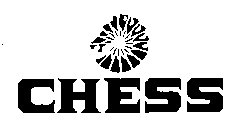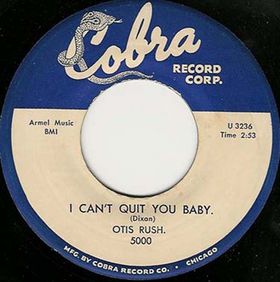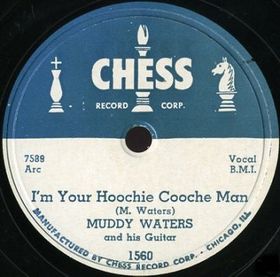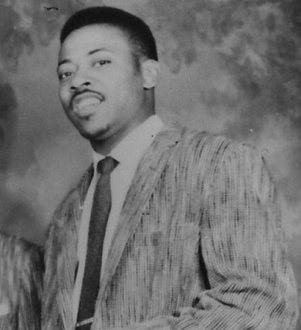
William James Dixon was an American blues musician, vocalist, songwriter, arranger and record producer. He was proficient in playing both the upright bass and the guitar, and sang with a distinctive voice, but he is perhaps best known as one of the most prolific songwriters of his time. Next to Muddy Waters, Dixon is recognized as the most influential person in shaping the post–World War II sound of the Chicago blues.

Chess Records was an American record company established in 1950 in Chicago, specializing in blues and rhythm and blues. It was the successor to Aristocrat Records, founded in 1947. It expanded into soul music, gospel music, early rock and roll, and jazz and comedy recordings, released on the Chess and its subsidiary labels Checker and Argo/Cadet. The Chess catalogue is owned by Universal Music Group and managed by Geffen Records and Universal Music Enterprises.

Freddie King was an American blues guitarist, singer and songwriter. He is considered one of the "Three Kings of the Blues Guitar". Mostly known for his soulful and powerful voice and distinctive guitar playing, King had a major influence on electric blues music and on many later blues guitarists.

Otis Rush Jr. was an American blues guitarist and singer-songwriter. His distinctive guitar style featured a slow-burning sound and long bent notes. With qualities similar to the styles of other 1950s artists Magic Sam and Buddy Guy, his sound became known as West Side Chicago blues and was an influence on many musicians, including Michael Bloomfield, Peter Green and Eric Clapton.

Samuel Gene Maghett, known as Magic Sam, was an American Chicago blues musician. He was born in Grenada County, Mississippi, and learned to play the blues from listening to records by Muddy Waters and Little Walter. After moving to Chicago at the age of 19, he was signed by Cobra Records and became well known as a bluesman after the release of his first record, "All Your Love", in 1957. He was known for his distinctive tremolo guitar playing.

"I Can't Quit You Baby" is blues song written by Willie Dixon and first recorded by Chicago blues artist Otis Rush in 1956. It is a slow twelve-bar blues ensemble piece, with lyrics about the consequences of an adulterous relationship which is difficult to end.

"Hoochie Coochie Man" is a blues standard written by Willie Dixon and first recorded by Muddy Waters in 1954. The song makes reference to hoodoo folk magic elements and makes novel use of a stop-time musical arrangement. It became one of Waters' most popular and identifiable songs and helped secure Dixon's role as Chess Records' chief songwriter.
"Wang Dang Doodle" is a blues song written by Willie Dixon. Music critic Mike Rowe calls it a party song in an urban style with its massive, rolling, exciting beat. It was first recorded by Howlin' Wolf in 1960 and released by Chess Records in 1961. In 1965, Dixon and Leonard Chess persuaded Koko Taylor to record it for Checker Records, a Chess subsidiary. Taylor's rendition quickly became a hit, reaching number thirteen on the Billboard R&B chart and number 58 on the pop chart. "Wang Dang Doodle" became a blues standard and has been recorded by various artists. Taylor's version was added to the United States National Recording Registry in 2023.

"Hide Away" or "Hideaway" is a blues guitar instrumental that has become "a standard for countless blues and rock musicians performing today". First recorded in 1960 by Freddie King, the song became a hit on the record charts. It has been interpreted and recorded by numerous blues and other musicians and has been recognized by the Rock and Roll Hall of Fame and the Grammy Hall of Fame.
"One Way Out" is a blues song that was recorded in the early 1960s by both Sonny Boy Williamson II and Elmore James. A reworking of the song by G. L. Crockett, titled "It's a Man Down Here", appeared on the Billboard record charts in 1965. In 1971, the Allman Brothers Band recorded an updated live version of the song, which was included on their popular Eat a Peach album (1972).
Joseph Leon "Jody" Williams was an American blues guitarist and singer. His singular guitar playing, marked by flamboyant string-bending, imaginative chord voicings and a distinctive tone, was influential in the Chicago blues scene of the 1950s.

"All Your Love (I Miss Loving)" or "All Your Love" is a blues standard written and recorded by Chicago blues guitarist Otis Rush in 1958. Of all of his compositions, it is the best-known with versions by several blues and other artists. "All Your Love" was inspired by an earlier blues song and later influenced other popular songs.

"Just Your Fool" is a rhythm and blues-style song written and recorded by the American jazz and jump blues bandleader/pianist Buddy Johnson and His Orchestra in 1953. Called an "R&B anthem", the song has a big-band arrangement and his sister Ella Johnson on vocals—her "delicate and deceptively sweet phrasing was ideally suited to ballads such as this". "I'm Just Your Fool" became a Billboard R&B chart record hit, reaching number six in 1954.

"Shake Your Moneymaker" or "Shake Your Money Maker" is a song recorded by Elmore James in 1961 that has become one of his best-known pieces. Inspired by earlier songs, it has been interpreted and recorded by several blues and other artists.

"Double Trouble" is a blues song written and recorded by Chicago blues guitarist Otis Rush in 1958. Since its release as a single in 1959, the song has been recorded by several blues and other artists, including several versions by Eric Clapton. Stevie Ray Vaughan named his band "Double Trouble" after Rush's song. In 2008, Rush's original version was inducted into the Blues Foundation Hall of Fame, who called it a "minor-key masterpiece".
"Checkin' Up on My Baby" is a song recorded by Sonny Boy Williamson II in 1960 that has become a classic of the blues. The song was not released as a single, but was included on Williamson's The Real Folk Blues album released after his death in 1965. The song has been recorded by numerous blues and other artists, making it one of Williamson's most recorded songs.

"I Can't Hold Out", also known as "Talk to Me Baby", is a blues song written by Willie Dixon and recorded by Elmore James in 1960 for the Chess label. Called a classic and a "popular James standard", it has been interpreted and recorded by several artists.
Elmore James was an American blues slide guitarist and singer who recorded from 1951 until 1963. His most famous song, "Dust My Broom", an electrified adaptation of a Robert Johnson tune, was his first hit and features one of the most identifiable slide guitar figures in blues. James' composition "The Sky Is Crying" and his rendition of Tampa Red's "It Hurts Me Too" were among his most successful singles on the record charts. Other popular James songs, such as "I Can't Hold Out", ""Madison Blues", "Shake Your Moneymaker", "Bleeding Heart", and "One Way Out", have been recorded by several other artists, including Fleetwood Mac, Jimi Hendrix, and the Allman Brothers Band.

Chicago/The Blues/Today! is a series of three blues albums by various artists. It was recorded in late 1965 and released in 1966. It was remastered and released as a three-disc album in 1999.

Billy Gayles was an American rhythm & blues drummer and vocalist. Gayles was a member of Ike Turner's Kings of Rhythm in the 1950s with whom he recorded for Flair Records and Federal Records as the lead vocalist. Gayles also backed various musicians, including Earl Hooker, Robert Nighthawk, Otis Rush, Albert King, and Richard Arnold "Groove" Holmes.















